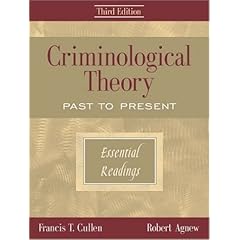Obviously, grad school is very different from college, and a PhD program is going to be different from a master's program. But in the end, the subject matter is the same: criminal justice is the study of crime and practitioners in the field, and criminology is the study of the causes of crime. This is an oversimplification; the real definition is amorphous and intricate and there is no one right answer, making it a bit difficult to explain to the layman (or just wrap your head around in general). I have this problem with my family and friends quite often, particularly my grandmother. She is thrilled to have a grandduaghter working towards a PhD, thrilled beyond belief. But she has no real understanding of the material, just a general sense of what I might be working on at any given time. And that is perfectly normal.
 So why does theory matter? If it's so hard to pin point and there are so many conflicting views, then why bother? Well, in order to try and change crime, you need to know what causes it. For instance, let's say there is a burning building. You could just throw water on it and be done. But that might be a temporary fix; what caused the building to light on fire in the first place? What is the root cause? By identifying the cause of the fire, you know whether you have to shut of the gas lines, find an arsonist, or take that pack of matches from the toddler. You see? In order to fix a problem, you need to identify what's causing the problem.
So why does theory matter? If it's so hard to pin point and there are so many conflicting views, then why bother? Well, in order to try and change crime, you need to know what causes it. For instance, let's say there is a burning building. You could just throw water on it and be done. But that might be a temporary fix; what caused the building to light on fire in the first place? What is the root cause? By identifying the cause of the fire, you know whether you have to shut of the gas lines, find an arsonist, or take that pack of matches from the toddler. You see? In order to fix a problem, you need to identify what's causing the problem. If you think crime is caused by biological factors, then identifying a "crime gene" or medicating offenders will fix crime. If you think it is a matter of social inequalities an upheaval, then social programs and community involvement will stop crime. And if you think that crime is a function of the ruling class's oppression of the under class, then the redistribution of wealth and power within society is the answer. These are by no means the only theories out there, but I think it illustrates the point. If you want to change something, you need to know what needs to be fixed first.
 If you are looking for books on criminological theory, I have two to recommend. The first is Cullen and Agnew's Criminological Theory: past to present. Unlike other tests that just summaries theories, this work offers the original articles that have become landmarks in the study of criminology. There is also a very handy grid in the first few The second is my personal favorite, Lilly, Cullen and Ball's Criminological Theory: Context and Consequence. Again, unlike other textbooks this work offers not just the theories, but the social, economic, political and cultural climate and changes that prompted new theories to develop. There are also discussions on whether these theories worked, and the long lasting effects of programs implemented on these recommendations. I personally felt that the chronological structure of this book, complete with the historical subtexts, gave me a greater understanding of where the theories came from and what they were a reaction to.
If you are looking for books on criminological theory, I have two to recommend. The first is Cullen and Agnew's Criminological Theory: past to present. Unlike other tests that just summaries theories, this work offers the original articles that have become landmarks in the study of criminology. There is also a very handy grid in the first few The second is my personal favorite, Lilly, Cullen and Ball's Criminological Theory: Context and Consequence. Again, unlike other textbooks this work offers not just the theories, but the social, economic, political and cultural climate and changes that prompted new theories to develop. There are also discussions on whether these theories worked, and the long lasting effects of programs implemented on these recommendations. I personally felt that the chronological structure of this book, complete with the historical subtexts, gave me a greater understanding of where the theories came from and what they were a reaction to.Theory may not be my favorite facet of my studies, but it's an important one. In order to understand where you are going, yo need to know what came before you. Happy theorizing!















